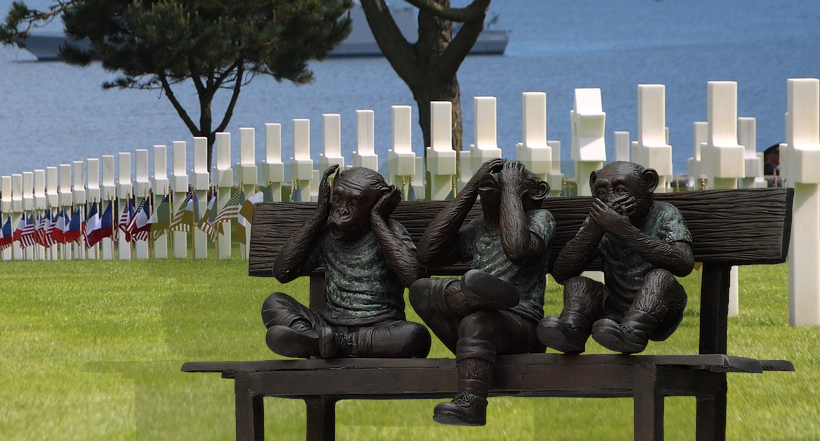
The Bible says “the dead know nothing,” but that doesn’t mean they’re oblivious.
Yet amongst those who profess belief in Sacred Scripture, there are some who deny a conscious existence after death – and they have a favorite passage in the book of Ecclesiastes:
For the living know that they will die, but the dead know nothing, and they have no more reward, for the memory of them is forgotten. Their love and their hate and their envy have already perished, and forever they have no more share in all that is done under the sun. (Ecclesiastes 9:5-6)
It was a favorite go-to passage of mine before I was Catholic, when I myself insisted on “soul sleep.” (I didn’t use the label “soul sleep,” but it’s a good description for the belief that the soul is void of all consciousness after death.)
It’s easy to see how a person could read these verses and conclude that the human spirit, or soul, is absolutely out of commission – shut off like a light switch – at the moment of death.
To me it was a closed matter. My approach could be summarized with the bumper sticker slogan: “The Bible says it, I believe it, that settles it!”
The problem was that while the Bible says it, I misunderstood it, which settled nothing.
So what about it? Does this passage insist the dead are unconscious and utterly unaware?
Seeing the book’s context
When I stepped back to see the context of what I was reading – beyond the couple verses to which I had always been directed – I could see better.

Anyone who reads all 12 short chapters of the book of Ecclesiastes straight through knows it is about the apparent vanity, or meaninglessness, of life.
It’s how the book begins:
Vanity of vanities, says the Preacher, vanity of vanities! All is vanity. What does man gain by all the toil at which he toils under the sun? (1:2-3)
The entire book follows this theme. It’s a broad inquiry into the meaning of life: What is the point of doing the things we do here “under the sun.” Is it all for naught? Is there rhyme or reason for what goes on in this life?
Keep in mind that the writer of Ecclesiastes wrote long prior to God speaking to us through his Son (Hebrews 1:2), so he didn’t have the full revelation we have through Jesus. Yet, inspired by the same God, our writer understood enough to conclude with this truth:
Of making many books there is no end, and much study is a weariness of the flesh. The end of the matter; all has been heard. Fear God and keep his commandments, for this is the whole duty of man. For God will bring every deed into judgment, with every secret thing, whether good or evil. (12:12-13)
Even now we can’t answer all the “why” questions in this life. The answers will be made evident to us later, but in the meantime we press on in faith anyway, trusting in God’s providence. Our duty is to persevere, to fear God and keep his commandments.
Now, about the meaning of “the dead know nothing”: Are there any clues under the sun that can help us understand?
“Under the sun”
The writer of Ecclesiastes is clearly concerned with everyday life under the sun – here on planet earth.
We know this because when we search for the word sun in Ecclesiastes (click or tap here), we see that it’s found in every chapter. It’s almost always part of the recurring phrase “under the sun,” and we can see what its talking about in context.
Among the things done “under the sun” include:
☀️ work
☀️ wickedness
☀️ riches
☀️ food and drink
☀️ time
☀️ love and hate
☀️ marriage
☀️ wisdom
☀️ chance
These are the kinds of things we all experience in everyday life, and they are discussed throughout the book.
“The dead know nothing”
With this basic understanding of the inspired writer’s theme, let’s revisit the passage in question:
For the living know that they will die, but the dead know nothing, and they have no more reward, for the memory of them is forgotten. Their love and their hate and their envy have already perished, and forever they have no more share in all that is done under the sun. (Ecclesiastes 9:5-6)
It would seem odd for the writer of Ecclesiastes to take a sudden thought detour in order to answer questions about metaphysics, such as whether the immaterial component of human beings (i.e., the soul, or spirit) possesses awareness even after the cessation of the body’s operations at death.
That would derail his train of thought. We should stick with him to stay on track.
What it means
Unless you were raised to believe as I did, you’re probably way ahead of me. It’s not hard to understand. Still, I will break it down here and summarize the plain sense of the passage:
| ECCLESIASTES 9:5-6 | COMMENTS |
|---|---|
| For the living know that they will die, | We go on doing what we do every day, but we still know – even if hidden in the back of our minds – that we will all one day die. |
| but the dead know nothing, | This same concern is not shared by the dead, because they’re already dead. They’re not doing the things living people do. Because they’re dead. |
| and they have no more reward, | The dead can no longer earn a paycheck. They can’t fall in love or get married. They can’t gain wisdom. They can’t get a new job. They can’t sit down to a delicious meal. Their life as they knew it here “under the sun” is over. It’s a whole new ball game. |
| for the memory of them is forgotten. | In other words, time goes on without you. All you did under the sun is no longer remembered by others. At best you become a fading memory, soon to be forgotten. You’re just one person of many who have come and gone in this timeline of human existence on earth. |
| Their love and their hate and their envy have already perished, and forever they have no more share in all that is done under the sun. | The opportunity to live this life now, under the sun, is over for the deceased. The people and things they loved and hated, their envies – it’s all in the past now. The dead can no longer make or change plans or interact in the same way with things the way they did during their earthly lifetime. That time is gone. |
We can argue our cases later about whether the immaterial, spiritual component of man survives bodily death. But we must admit that nothing in these verses demands the conclusion that death involves the cessation of all consciousness.
Still not buying it?
Maybe you grew up like me, or spent much of your life having been convinced of “soul sleep” – saying things like, “When you’re dead, you’re dead!” or “When you’re dead, it’s like being asleep,” or “Death is the absence of life,” or “Only God has immortality,” etc. Years of this mindset will obviously color your otherwise good sensibilities.
Maybe you think I have fallen prey to “human reasoning,” that I’m only trying to justify what I want to believe, or that I refuse to believe clear declarative statements in the Bible – such as “the dead know nothing” (period!).
If that’s you, I understand where you’re coming from. But let’s be fair. Let’s turn the table and see how reasonable it is to apply the same unbending, woodenly literal approach I once had to every part of these verses.
| ECCLESIASTES 9:5-6 | COMMENTS |
|---|---|
| For the living know that they will die, | Very young children are living, and they don’t know this. Does this fact make the verse untrue? |
| but the dead know nothing, | |
| and they have no more reward, | How can this be, when Jesus taught in the parable of the great banquet, “For you will be repaid at the resurrection of the just” (Luke 14:14)? That’s the best reward the dead can receive! |
| for the memory of them is forgotten. | Not true, right? We have monuments and histories devoted to the dead. We know about George Washington, Nero, Aristotle, Ezekiel, King David, Moses, Abraham. And how can we forget the very first human beings to walk the earth? The fact that we know Jesus as the “last Adam” proves we’ve not forgotten the “first man Adam” (1 Corinthians 15:45)! |
| Their love and their hate and their envy have already perished, and forever they have no more share in all that is done under the sun. | We might consider the writer of Ecclesiastes to be a “resurrection denier” if we held him to the strictest standards of human speech! Indeed, our resurrection will take place right here “under the sun”! Death is not forever! Will love indeed perish? Not according to the great apostle Paul’s plain declaration: “Love never ends” (1 Corinthians 13:8). He doesn’t say it ends at death. Does he disagree with the book of Ecclesiastes? |
Of course, we run into problems like this when we miss the writer’s intended point. We stretch his statements too far – just like we do when we artificially absolutize his words “the dead know nothing” – by taking them out of context and thus distorting their meaning.
The end of the matter
We can understand where the writer of Ecclesiastes was coming from with his “optimistic futility.” He only knew and communicated what he could, having not yet heard the gospel through Jesus and his Church.
Even so, we can still embrace his inspired message: Whatever the state of our health, whatever our hopes, whatever our joys or jobs, pursuits or pleasures – all these things “under the sun” are temporary.
Our lives must therefore reflect this fact – beginning today – because our every deed, whether good or evil, will be brought into judgment.